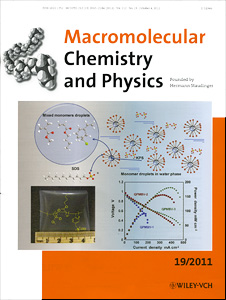New Advance for Alkaline Fuel Cells
Work by Clark School Department of Chemical and Biomolecular Engineering (ChBE) graduate student Yanting Luo and former ChBE assistant research scientist Juchen Guo could improve the performance and cost of low-temperature fuel cells. The work recently was featured on the cover of Macromolecular Chemistry and Physics. Luo, advised by ChBE assistant professor and University of Maryland Energy Research Center member Chunsheng Wang, synthesized a new polymer designed for use as the solid alkaline polymer electrolyte (APE) in alkaline fuel cells (AFC). AFCs are an alternative to the proton-exchange membrane fuel cells (PEMFCs). Like PEMFCs, AFCs can operate at relatively low temperatures, making them suitable for use in transportation and electronics. AFCs have existed in various forms since the 1930s. While more efficient and lower in cost than PEMFCs, as well as capable of generating heat and drinking water as by-products, they require pure compressed oxygen and hydrogen to work and to prevent degradation if exposed to carbon dioxide. As a result, their use has often been restricted to sealed environments, including spacecraft. Luo says the development of a solid APE to replace the liquid electrolyte has inspired a "revived interest" in producing AFCs for the consumer market. Creating a more durable solid electrolyte with a high power output for AFCs is a key step in their commercialization process. Using a technique called "miniemulsion copolymerization," Luo and her colleagues created an APE that could be tuned (adjusted and controlled) for ideal mechanical properties and conductivity during the manufacturing process. Read the full story on the Department of Chemical and Biomolecular Engineering web site.
Related Articles: January 19, 2012 Prev Next |


